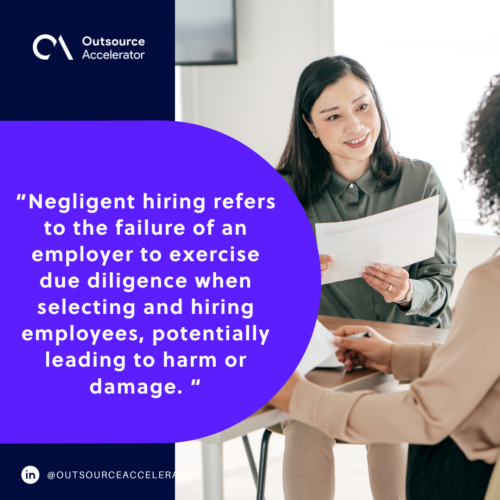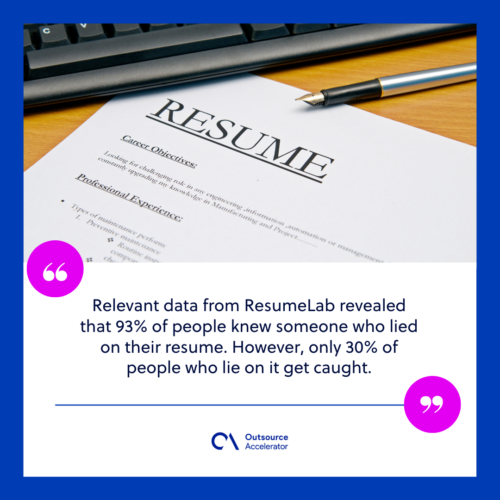Negligent hiring and how to avoid it

Imagine hiring an employee who ends up causing significant harm to your business or others. This nightmare scenario, known as negligent hiring, can have devastating consequences for any organization.
It occurs when an employer fails to exercise reasonable care in the hiring process, resulting in the employment of an individual who poses a foreseeable risk.
Data from PeopleFacts revealed that 72% of employers lose negligent hiring lawsuits. Additionally, the payout from these lawsuits could reach over $1 million. This shows there’s a lot at stake when faced with the possibility of making a bad hire.
Let’s dive into what negligent hiring is, discuss its elements, and provide examples. Most importantly, we’ll explore how you can detect and prevent it from happening.
What is negligent hiring?
Negligent hiring refers to the failure of an employer to exercise due diligence when selecting and hiring employees, potentially leading to harm or damage.
The key concept here is foreseeability. If an employer could have reasonably anticipated an employee posed a risk to others but failed to uncover or address that during the hiring process, they may be held liable for negligent hiring.
The harm it could cause can range from workplace accidents to theft or even violence.
It’s not just about finding the right person for the job — it’s about ensuring that person won’t pose a risk to your team or your company.

Elements of negligent hiring
To establish a case of negligence in hiring, several elements need to be present:
- Duty of care. The employer has a duty to take reasonable steps to ensure that the individuals they hire are competent and fit for the position.
- Knowledge or foreseeability. The employer must have had knowledge or should have reasonably foreseen that the employee posed a risk.
- Breach of duty. The employer fails to meet the duty of care by not conducting adequate background checks or ignoring red flags during the hiring process.
- Causation. The employee’s actions or behavior resulting from negligent hiring directly cause harm to others.
Examples of negligent hiring
Negligent hiring can occur in various contexts, and the consequences can be severe. Here are a few examples:
Lack of background checks
Consider a scenario where a company skips background checks, unknowingly hiring someone with a history of violence.
If that employee engages in a violent incident at the workplace, the company could be held liable for negligence in hiring.
Inadequate reference checks
Imagine hiring someone based solely on a glowing recommendation without conducting thorough reference checks.
If that person turns out to have a track record of dishonesty or unethical behavior, it exposes the company to potential harm and legal repercussions.
Ignoring red flags
Suppose an applicant’s resume raises red flags, such as unexplained employment gaps or inconsistent work history. If an employer overlooks these signals and hires the individual, they may be held accountable if issues arise later.
Relevant data from ResumeLab revealed that 93% of people knew someone who lied on their resume. However, only 30% of people who lie on it get caught.

How to detect negligent hiring
Detecting hiring negligence requires thorough and diligent screening processes. Here are a few steps you can take to identify potential red flags:
Comprehensive background checks
Implement background checks tailored to the specific job requirements, including:
- Employment verification
- Education verification
- Criminal records checks
- Reference checks
Consider using third-party screening services for a more comprehensive and unbiased assessment.
Review online presence
Examine an applicant’s online presence, including social media profiles, to gain insights into their behavior and character. However, ensure compliance with privacy laws in doing so.
Contact previous employers
Reach out to previous employers to confirm employment details, performance, and any potential disciplinary actions. This step provides additional insight into an applicant’s work history and behavior.
How to avoid negligent hiring
Preventing negligent hiring is the most effective way to protect your business and employees. Consider the following preventive measures:
Detailed job descriptions
Create clear and specific job descriptions. This ensures applicants understand the role’s requirements and align expectations with the organization. It could reduce the risk of hiring unsuitable candidates.
Structured interviews
Use a structured interview process with a set of predetermined questions tailored to the job requirements. This helps to assess candidates consistently and objectively. It minimizes bias and enhances the likelihood of hiring the right fit.
Reference and credential verification
Verify the accuracy of information provided by candidates, such as educational qualifications, certifications, and licenses. Contact references provided by the applicant to gain insights from previous employers or colleagues.
Prevent future negligent hiring
To prevent future incidents of negligent hiring, ongoing review and improvement of your hiring processes are crucial.
Consider the following:
- Regular training. Train hiring managers and HR personnel on best practices for candidate screening, interviewing techniques, and recognizing potential warning signs of unsuitable candidates.
- Periodic policy reviews. Regularly review and update your hiring policies and practices to align with legal requirements, industry standards, and emerging trends.
- Post-hire monitoring. Implement post-hire monitoring processes to detect any concerning behavior or performance issues early on. Regular performance evaluations and feedback discussions can help promptly identify and address potential problems.

Negligent hiring can have devastating consequences for your organization. You can significantly minimize its risk through robust background checks, maintaining strong hiring practices, and staying vigilant throughout the employee lifecycle.
Doing so safeguards your business and creates a safer and more productive work environment where employees can thrive.
Remember, the key to avoiding negligent hiring lies in due diligence, comprehensive screening processes, and a commitment to hire the best candidates for your organization.







 Independent
Independent




